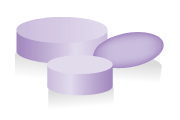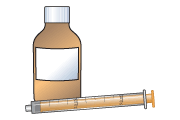Aripiprazole for schizophrenia, bipolar disorder and tics
This leaflet is for parents and carers about how to use this medicine in children. Our information may differ from that provided by the manufacturers, because their information usually relates to adults. Read this leaflet carefully. Keep it somewhere safe so that you can read it again.
Do not stop giving aripiprazole suddenly, as your child is likely to get withdrawal symptoms
Name of medicine
Aripiprazole (AR-i-PIP-ra-zole)
Brand name: Abilify®
This leaflet is about the use of aripiprazole for the treatment of schizophrenia and bipolar disorder (sometimes called psychotic disorders) and tics, such as seen in Tourette’s syndrome.
Why is it important for my child to take aripiprazole?
Aripiprazole changes the levels of some important chemicals in the brain such as dopamine and serotonin.
- For children with schizophrenia or bipolar disorder, aripiprazole can reduce your child’s symptoms and help their mood and behaviour to be more stable.
- For children with tics, aripiprazole will help to reduce the severity and frequency of tics.
Read more about tics here: www.nhs.uk/conditions/tics/
What is aripiprazole available as?
Tablets: 5 mg, 10 mg, 15 mg, 30 mg; these contain lactose
Orodispersible tablets: 10 mg, 15 mg; these contain a small amount of aspartame
Liquid medicine: 5 mg in 5 mL
When should I give aripiprazole
Aripiprazole is usually given once a day. This is usually in the morning. Give the medicine at about the same time each day so that this becomes part of your child’s daily routine, which will help you to remember
How much should I give?
Your doctor will work out the amount of aripiprazole (the dose) that is right for your child. The dose will be shown on the medicine label.
Your doctor may suggest that your child has a low dose to start with. They may then increase the dose as your child gets used to the medicine and depending on how your child responds to it.
It is important that you follow your doctor’s instructions about how much to give.
How should I give aripiprazole?

Tablets
- Tablets should be swallowed with a glass of water, squash or juice. Your child should not chew the tablet.

Orodispersible tablets
Ensure your hands are dry before removing the tablet from the pack. Put it on your child’s tongue straight away. The tablet will dissolve rapidly. You can also dissolve it in a glass of water. Your child should drink it all straight away.

Liquid medicine
Measure out the right amount using a medicine spoon or oral syringe. You can get these from your pharmacist. Do not use a kitchen teaspoon as it will not give the right amount.
When should the medicine start working?
This depends on what your child is being treated for.
- If your child has been agitated as part of their illness, this should decrease after taking an adequate dose of aripiprazole for a few days.
- If your child is being treated for elated mood (being extremely happy), they should seem calmer after about a week of reaching the adequate dose.
- If your child gets hallucinations (seeing or hearing things that are not there), these should start to get better after about 2 weeks. It may take longer than this for delusions (believing something to be real that is not) to stop. It may take 6–8 weeks before your child’s mood and behaviour seem more normal.
- If your child is being treated for tics or Tourette’s syndrome, it is likely to take 4–6 weeks for symptoms to get better.
It is important that you continue to give the medicine every day, as your doctor has told you to. However, as the medicine may not work sufficiently in some children, if you are concerned about whether it is working, contact your doctor.
What if my child is sick (vomits)?
- If your child is sick less than 30 minutes after having a dose of aripiprazole, give them the same dose again.
- If your child is sick more than 30 minutes after having a dose of aripiprazole, do not give them another dose. Wait until the next normal dose.
If your child is sick again, seek advice from your family doctor, nurse, pharmacist, or hospital. They will decide what to do based on your child’s condition and the specific medicine involved.
What if I forget to give it?
Give the missed dose when you remember during the day, as long as this is at least 12 hours before the next dose is due.
Never give a double dose of aripiprazole.
What if I give too much?
If you think you may have given your child too much aripiprazole, contact your doctor or your local NHS services (111 in England and Scotland; 111 or 0845 4647 in parts of Wales) or take your child to hospital.
Take the medicine container or packaging with you, even if it is empty. This will be useful to the doctor. Have the medicine or packaging with you if you telephone for advice.
It can be dangerous to give too much aripiprazole.
Are there any possible side effects?
We use medicines to make our children better, but sometimes they have other effects that we don’t want (side effects).
Side effects you must do something about
Contact your doctor straight away if your child has any of the following:
- muscle spasms (stiffening of the muscles), twitching in the face and body, or uncontrolled movements of the tongue or jaw, or they seem restless and cannot control their movements
- fever, sore throat, rash or mouth ulcers.
Other side-effects you need to know about
Your child may feel sleepy, tired or weak when they first start taking this medicine. These effects usually wear off as your child’s body gets used to the medicine If they are still a problem after 2 weeks, contact your doctor.
Your child may get stomach ache and feel sick (nausea) or constipated (difficulty doing a poo). Encourage them to drink plenty of fluid and to eat foods that contain fibre (e.g. wholemeal foods, fruit and vegetables). If this is still a problem after 2 weeks, contact your doctor.
They may feel light-headed or dizzy when they stand up, or may faint. This is because aripiprazole may lower the blood pressure. They should stand up slowly, and should lie down for a while if they feel dizzy. If this becomes a problem, contact your doctor.
Your child may find that their eyesight seems blurred. If this carries on for longer than 2 weeks, contact your doctor.
Your child’s appetite may increase and this may result in weight gain.
Your child’s skin will be more sensitive to sunlight. Keep them out of strong sun. When outdoors, they should wear a long-sleeved top, trousers and a hat and should use a high-factor sun screen (at least SPF 30).
Rarely, your child may feel very low (depressed) or have thoughts about suicide. Contact your doctor if this happens.
Can other medicines be given at the same time as aripiprazole?
- You can give your child medicines that contain paracetamol or ibuprofen, unless your doctor has told you not to.
aripiprazole should not be taken with some medicines that you get on prescription. It is important to tell your doctor and pharmacist about any other medicines your child is taking before starting aripiprazole.
Check with your doctor or pharmacist before giving any other medicines to your child. This includes herbal and complementary medicines.
Is there anything else I need to know about this medicine?
Do not suddenly stop giving your child aripiprazole, as they may get withdrawal symptoms (difficulty sleeping, tremor, anxiety, nausea, vomiting).
Do not change the dose of aripiprazole that you give your child without discussing this with your doctor.
If you or your child wants to stop aripiprazole, discuss this with your doctor. They may want to reduce the dose slowly so that your child doesn’t get withdrawal symptoms.
Teenagers should be aware that if they drink alcohol while taking aripiprazole, the effects will be stronger. Ideally, they should not drink alcohol.
Aripiprazole can affect the ability to do skilled tasks such as driving.
General advice about medicines
- Try to give medicines at about the same times each day, to help you remember.
- Only give this medicine to your child. Never give it to anyone else, even if their condition appears to be the same, as this could do harm.
- Make sure that you always have enough medicine. Order a new prescription at least 2 weeks before you will run out.
- Make sure that the medicines you have at home have not reached the ‘use by’ date on the packaging. Give old medicines to your pharmacist to dispose of.
If you think someone else may have taken the medicine by accident, contact your doctor straight away.
Where should I keep this medicine?
- Keep the medicine in a cupboard, away from heat and direct sunlight.
- It does not need to be kept in the fridge.
- Make sure that children cannot see or reach the medicine.
- Keep the medicine in the container it came in.
- Some liquid medicine does not keep for long once opened. Write the date that you start it on the bottle and do not keep the medicine for longer than stated on the label.
Who to contact for more information?
Your child’s doctor or pharmacist will be able to give you more information about aripiprazole and about other medicines used to treat your child’s condition.
England: NHS 111
Tel 111
www.nhs.ukScotland: NHS 24
Tel 111
www.nhs24.scotNorthern Ireland: NI Direct
Wales: NHS 111 Wales
Tel 111
www.111.wales.nhs.ukMind (mental health support)
0300 123 3393
www.mind.org.ukTourettes Action
0300 777 8427
https://www.tourettes-action.org.ukYoung Minds - parent helpine
0808 802 5544
www.youngminds.org.ukCopyright disclaimer
Version [2]. © NPPG, RCPCH and WellChild, all rights reserved. Review by January 2018.
The primary source for the information in this leaflet is the British National Formulary for Children. For details on any other sources used for this leaflet, please contact us through our website, www.medicinesforchildren.org.uk.
We take great care to make sure that the information in this leaflet is correct and up-to-date. However, medicines can be used in different ways for different patients. It is important that you ask the advice of your doctor or pharmacist if you are not sure about something. This leaflet is about the use of these medicines in the UK, and may not apply to other countries. The Royal College of Paediatrics and Child Health (RCPCH), the Neonatal and Paediatric Pharmacists Group (NPPG), WellChild and the contributors and editors cannot be held responsible for the accuracy of information, omissions of information, or any actions that may be taken as a consequence of reading this leaflet.
